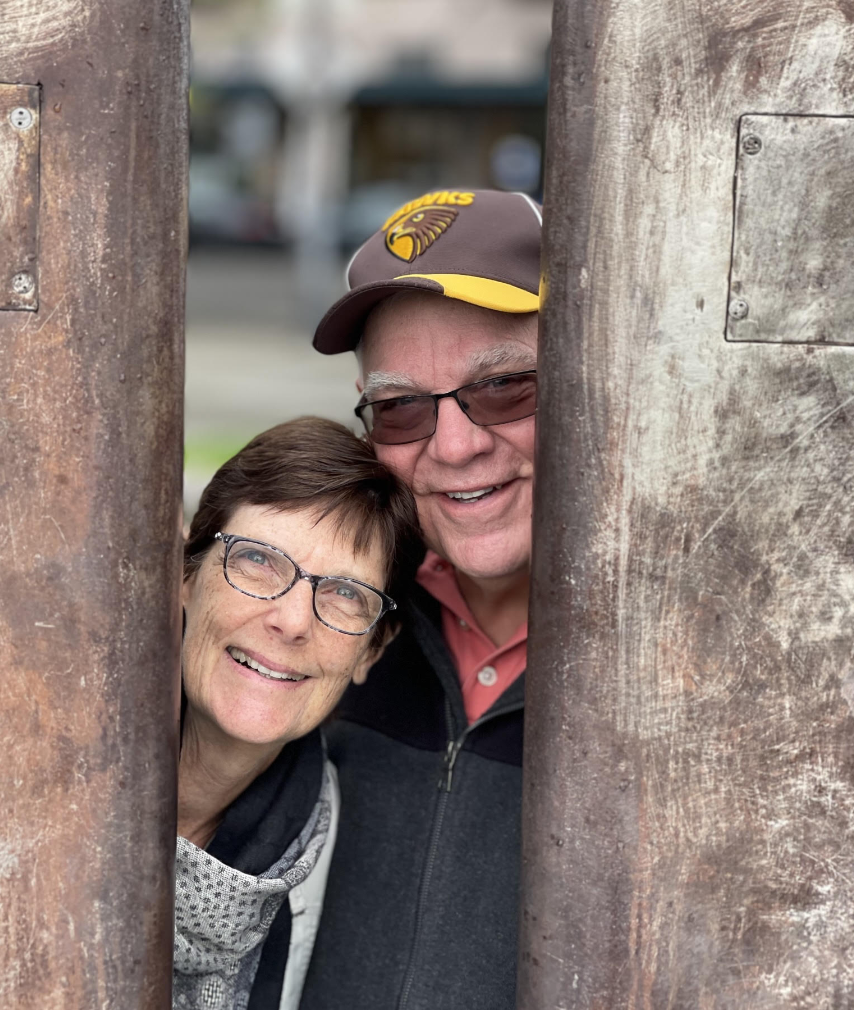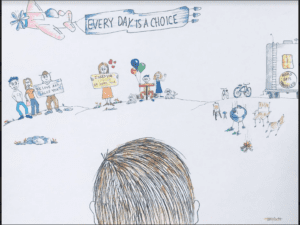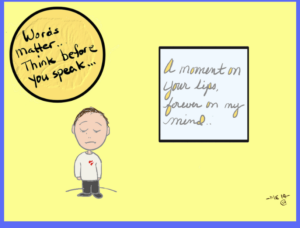

By Mary Fridley
(artwork by Wally Cox)
I recently had the great good fortune to speak with Wally Cox, a dear friend of mine who has lived with dementia for over eight years. I met Wally through The Joy of Dementia (You Gotta Be Kidding!) workshop series I lead for the East Side Institute. We now work closely together as leaders of Reimagining Dementia: A Creative Coalition for Justice. He is also on the board of Dementia Alliance International. Wally is a wonderful artist and, in his own words, “An advocate for those with dementia and for those who care and love them. My goal is to see a reframing of how many view this disease… from a life of can’t, to a life of can.” Wally and his wife Pat live in northern California and have three children and two grandchildren.
While the entire conversation was fascinating, I am most interested in sharing Wally’s belief that “every day is a choice.” In a world in which it is far easier, and more common, to believe that we have no choices, especially when it comes to our emotional life – “I’m angry so of course I have to lash out in hurtful and ugly ways” or “I can’t possibly do that, I’m too scared” being just two examples – I know I was inspired by Wally’s refreshing “take” on all this. I believe we can all learn and grow from his insights and experiences:

“Here I am on the other side of the wall [Wally is referring to the time he spent as a care partner for Pat, prior to his own diagnosis]. I’m going to need a caregiver so what do I do? I begin building walls again because it’s emotionally easier to shut yourself off and not embrace the situation you’re in. I’m going to deny this, I’m going to turn off, I’m going to check out, I’m going to go away. And through the great wisdom of my wife, she got me hooked up with the Alzheimer’s Association, where I went to some groups, and Dementia Alliance International. And lo and behold, I went in and there are people living with Alzheimer’s or Lewy Body or whatever. “Yeah, I got Lewy Body but I’m still painting.” “I can’t drive but I ride a bike.” “How long you been like this?” “Oh, 10 years” So I’m thinking, “Wait a minute, that’s a long time for me to live under a rock.” I don’t want to be hiding away for that long so I figured out what I needed to do was quit worrying about what other people think. If it comes up – and I don’t wear it like a badge of honor, but if it comes up, I am no longer ashamed to talk about it. I am no longer fearful of what people are going to say.
And one of the things I found out is that almost everyone I talked to had someone in their life who is dealing with this. And because we’re being diagnosed earlier and earlier, it’s not like the final stages of dementia that you’re being diagnosed with. You’re not, god bless you, in a care home unable to feed yourself, you still got life left so what are you going to do with the life you have left? Do you charge forward and live my life and do what I can with what I can do or am I going to go home and turn off from everything and hide in fear and pain? Well, it’s a lot more fun to go out and do the things you can do than it is to go home and wait to die in pain. So I made that choice. Every day is a choice. You get up in the morning and you have a choice. I’ve spoken about it being like being on one of those merry-go-rounds in a park. Well, I was on one and hanging on for dear life and spinning like crazy, staring resolutely at the middle of it. And in the middle was my diagnosis. There is dementia, despair, death, destruction, and all these things. I’m looking at it and thinking, “This is my life, I have to hang on.” But behind me is my wife, my children, my faith, going for walks, nature, art, music, it’s still there. But I have to change my perspective from inward to outward. I have to learn to live my life outwardly. My role as a dad and uncle and friend is to show how to live a whole life with the hand you’re dealt no matter what.”

In other words, we can all perform, and in performing, not only make but create choices for ourselves and others. Of course, most of us don’t view ourselves as “performers,” so I’m here to help you along. A fun way we do this in the Joy of Dementia workshops is by directing participants to work on their “audience performance.” So I’m going to ask you to take a moment and perform as someone outraged by everything you’re reading. You did great! Or to perform as someone who is bored by this whole experience. See, you know exactly what to do! Now keep it going. When you find yourself in a situation in which you find yourself responding in the same old way (even if that way is a “good” way), take a moment to create a new performance. What I love about how Wally is living his life is that in asking how he wants to live every day, he is acknowledging that he is a member of an “ensemble” rather than a lone actor. And the more we can see ourselves as performers (in the most ordinary sense of that word), we begin to see that, as performers-in-life, we can continuously and collectively make choices and create new responses – in the workshop and in life.
Mary Fridley is on the faculty at the East Side Institute in NYC, co-creator and leader of The Joy of Dementia (You Gotta Be Kidding!), and coordinator of Reimagining Dementia: A Creative Coalition for Justice. An accomplished teacher and workshop leader, Mary practiced social therapy for 12 years and uses the social therapeutic approach as a teacher and workshop leader. She is the author or co-author of several articles and chapters on the Joy of Dementia, including a chapter that appears in The Applied Improvisation Mindset published in August 2021. Additionally, Mary is a guest blogger for agebuzz and a playwright and theater director. She makes her living as a non-profit fundraising consultant. She can be contacted at [email protected].